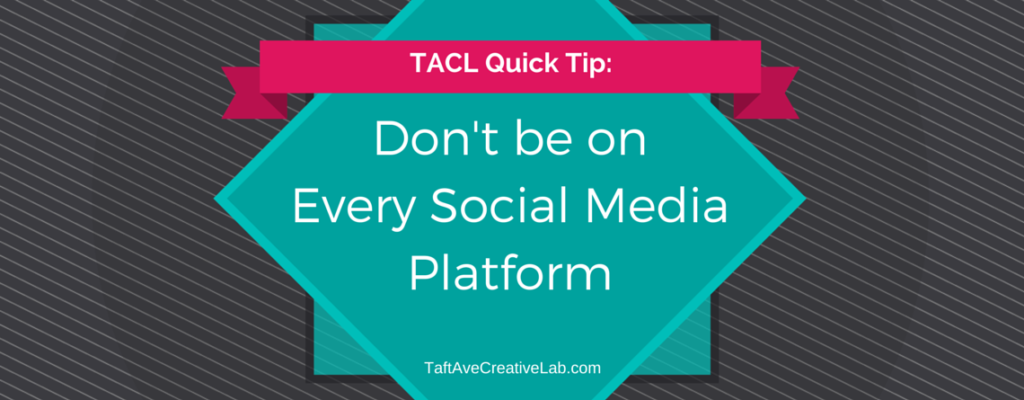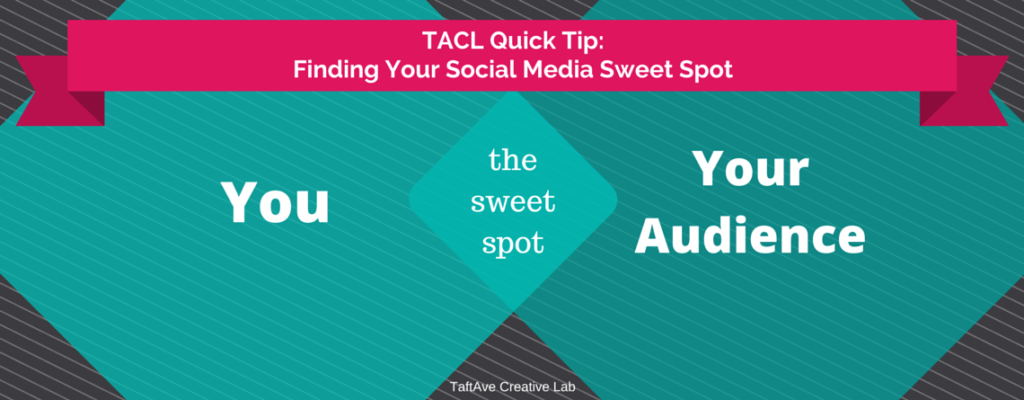Short answer, no your business should not be on every social media platform. This is not blasphemy.
Being on every single social media platform ever made is a big mistake.
Being on a popular social media platform that you don’t enjoy using is another mistake.
Are you a creative entrepreneur struggling to get into social media? A small business owner who sees social media marketing as a necessary evil? If you’re struggling with your business’ social media efforts, then this post is for you.
The past week I’ve heard so many amazing creative entrepreneurs talk about their frustrations over social media marketing. Mostly, the frustration boiled down to a common theme: They were overwhelmed and confused.
Most of them have read or heard a lot of expert advice. Advice like: they need to be on at least x number of social media platforms; that given the nature of their business, they should definitely use x; that they should have separate sets of social media accounts–one for business and another for personal.
While these all sound like perfectly reasonable advice–it ignores one crucial thing: that every business (and every entrepreneur) is different. As such, what works for most will not necessarily work for you.
You should be on at least 3 social media platforms.
A survey conducted by HubSpot, an industry leader in Inbound Marketing report that consumers expect brands to be on at least 3 social media platforms. This has resulted in many social media marketing experts echoing these results, offering them as advice for entrepreneurs and small businesses.
Here’s the problem, not every business has the capacity or resources to be on at least 3 social channels–especially with small business owners and hands-on creative solopreneurs. It’s difficult enough to juggle multiple hats as a small business owner.
I must admit that I have bought into this well-meaning advice before. When I started one of my old blogs, the first thing I did was sign-up for practically every social channel everyone else was on. The result? I spread myself too thin and I ended up being ineffective in pretty much all of them. Instead of growing my network by being in all those social channels, I ended up neglecting most of them and being inauthentic in some.
My advice: Pick and choose what you can manage. If you do not have the time to engage in or maintain 3 social media accounts, then don’t do it. Start slow by focusing on one social channel first. Grow your following and engage with your audience. Once you get the hang of it, then maybe you can consider adding a second one. Then, eventually a third.
It is better to do remarkably well on less social channels than be severely ineffective on multiple platforms.
You should be on this social media platform.
You’ve read those headlines before: X number of reasons why you should be on this social channel. Why you should use this new shiny social channel.
I’ve heard many creative entrepreneurs, especially those in visual arts, feel pressured to have an Instagram account. Others feel like they must have at least a Facebook page.
My advice: Again, pick and choose what works for you. If a certain social channel doesn’t feel natural or authentic to you, don’t do it. Social media is supposed to be a tool that let’s your inherent awesomeness shine.
If Instagram doesn’t feel right to you right now, focus on a platform that does. One of the main objectives of using social media for business if to relate and communicate with your current & prospective clients. If you’re wasting your time and energy trying to use a platform that you don’t feel comfortable in, your audience will know. This can translate to inauthenticity, which will do more harm than good for your brand. You’re better off investing your time and energy on the platform that feels right to you.
You should separate your personal & business social media accounts.
Or conversely, you will hear many social sellers say, “You should use your personal social media accounts for social media marketing because people relate with people, not stiff corporate faceless brands.”
So what is it really? Are we supposed to keep personal and business accounts strictly separate or not?
The answer is it depends. Every business is different. Every entrepreneur is different. Every case is different. So unfortunately, there is no one clear answer.
My advice: Reflect on your business and review your business (and marketing) goals. Then, if you haven’t created a social media strategy, start by thinking about the role of social media in your marketing goals and objectives. If you are your business (i.e. maybe you are a life coach, a lifestyle blogger, a fitness instructor, an author, etc) then it might make sense to merge your personal and business accounts. On the flip side if your business is less personal, then it makes sense to keep them separate.
For example, I have a separate Twitter account for TaftAve Creative Lab (TACL). This is because TACL has a very focused audience: creative small business owners who need help with their marketing. As such, they will benefit from hearing tips, tricks and advice about small business marketing–not about how I spent my weekend or where my dog takes a nap. That being said, my business Twitter account is not devoid of my personality. After all, keeping a separate business account does not mean you should sound stiff and contrived. Don’t be afraid to let your brand personality show!
Find your own social media sweet spot
I wish I could tell you that there is a be-all end-all of sage-like social media advice. Sadly, as far as I know, there’s no such thing.
Your social media sweet spot–the one that will work for you and your small business–is unique to you. The key is knowing your brand personality and your target audience. You may ask yourself the following questions:
- What social media platform do you like best?
- Which one works with your communication style?
- Which channel will best aid your business goals?
- Who are you trying to reach with your social media marketing efforts?
- Where do those people (your clients and prospects) hangout online?
The better you know your business and your audience, the faster you’ll be able to figure out what will work for you. Remember that you and your business are on a unique journey. While there is definitely value in expert insight and industry reports, you should know your business best. Don’t be afraid to do what works for you.
Was this post helpful? Let me know in the comments below.
I’d love to hear how you use social media for your business!


